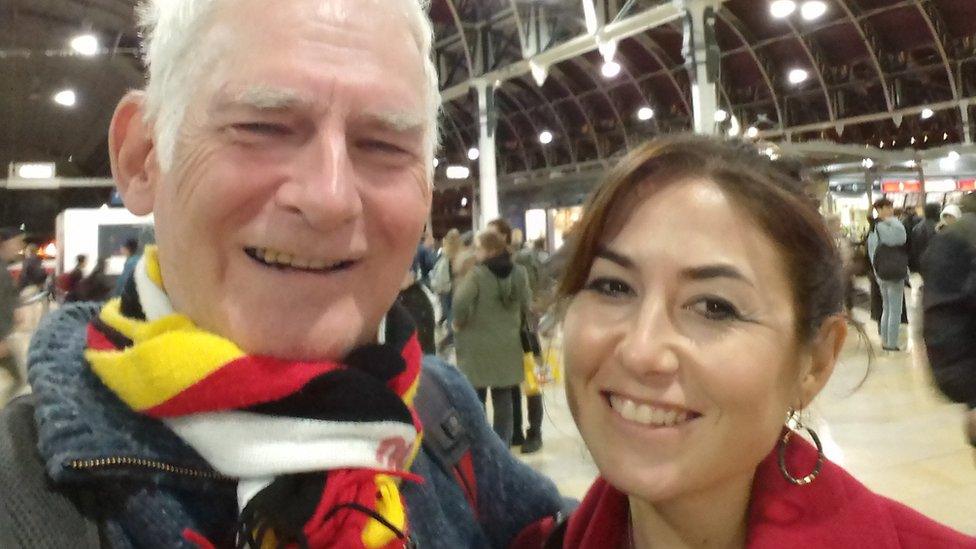Boeing's 737 Max cleared to fly in the US after crashes
- Published
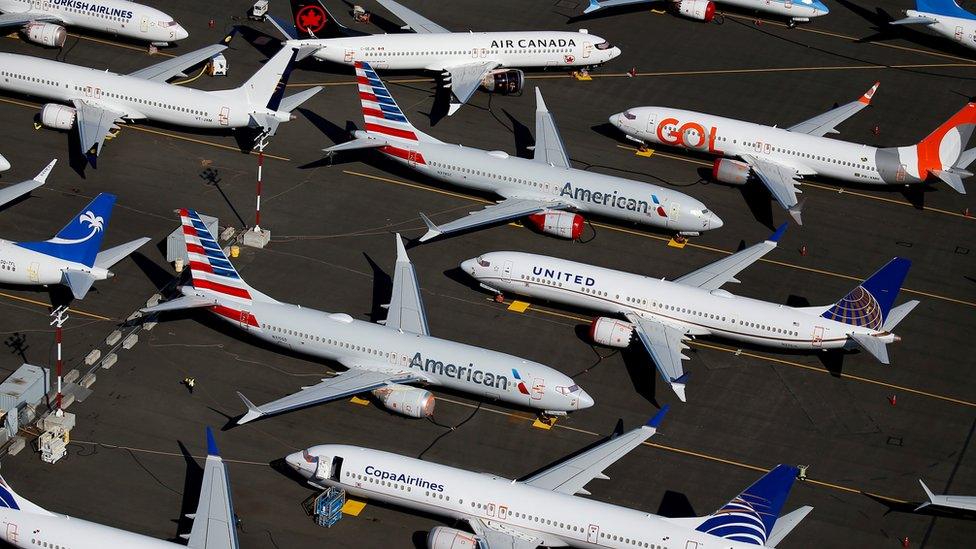
Regulators around the world ordered 737 Max grounded after crashes in Indonesia and Ethiopia
US safety regulators have cleared Boeing's 737 Max plane to fly again, lifting grounding orders put in place in March 2019 after two deadly crashes.
It marks a milestone for Boeing which was thrust into crisis by the tragedies and investigations that blamed company failures for the accidents.
Its financial woes deepened this year as air travel slowed due to the virus.
Existing aircraft will need to be modified before going back into service, with changes to their design.
Safety regulator, the US Federal Aviation Administration (FAA), said the clearance would not allow the plane to "return immediately" to the skies.
Alongside the software and wiring changes, pilots will also need training.
The FAA said the design changes it had required "have eliminated what caused these particular accidents".
The boss of the FAA said he was "100% confident" in the safety of the plane.
"We've done everything humanly possible to make sure" these types of crashes do not happen again," Steve Dickson said.
As well as improvements to the plane, Boeing chief executive Dave Calhoun said the company had strengthened its safety practices and culture since the disasters.
"We will never forget the lives lost in the two tragic accidents that led to the decision to suspend operations," said Mr Calhoun, who took over when his predecessor, Dennis Muilenburg, was fired last year.
"These events and the lessons we have learned as a result have reshaped our company and further focused our attention on our core values of safety, quality and integrity."
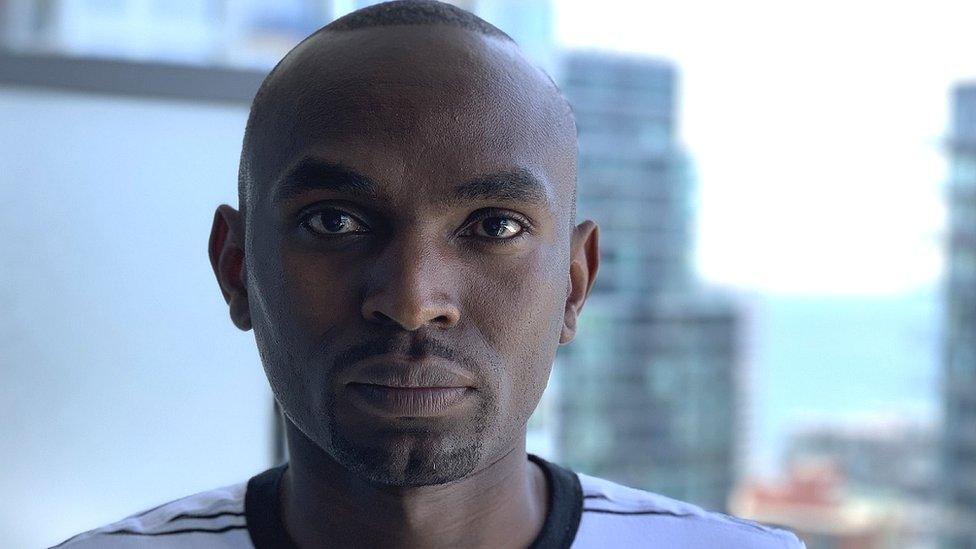
Paul Njoroge, who lost his wife, three children and mother-in-law in the Ethiopian Airlines crash, says he lacks confidence in Boeing
Wednesday's approval comes roughly a year after Boeing had first hoped, but too soon for many of the families of those killed on the flights.
Some expressed "sheer disappointment" over the decision, while others said they did not have confidence in regulators or Boeing, which initially sought to pin the crashes on pilot error and is still fighting victims' families in court.
"Who's going to believe them? Not me," said Paul Njoroge, whose wife, three children and mother-in-law were killed in the Ethiopian Airlines flight 302 crash.


Will the 737 Max be safe?
Boeing and the FAA insist it will be - and certainly the direct cause of the accidents has now been fixed. Pilots and safety experts seem confident that the changes made to the plane will be effective.
But both Boeing and the regulator still have much to prove.
For Boeing, that the scathing criticisms of its corporate culture have been addressed, and that safety really is, as it often claims, its number one priority.
For the FAA, that it can stand up to the aerospace giant and recover from the failures that allowed a deeply flawed plane into service, resulting in tragedy.
The aircraft is coming back, but the world has changed. It was designed for a booming market, in which airlines desperately needed new planes and in which high fuel prices put a premium on efficiency.
Now, the aviation industry is on its knees thanks to the Covid crisis. It's no surprise then that some airlines have been cancelling orders.
However, the industry looks to the long term. Air traffic will ultimately recover, and pressure to keep costs down will return. Environmental pressures are only going to grow.
The 737 Max still has a role to play.

The US is the first to reverse the grounding orders, which hit the firm around the world in March 2019. European aviation officials have said they are close to making a similar decision.
A spokesperson for the UK Civil Aviation Authority said the European Union Aviation Safety Agency (EASA) was in charge of re-certification for EU member states, as well as the UK. "We continue to work closely with EASA on all issues relating to the B737 Max and any EASA decision on a return to service," he added.
On a briefing with reporters, Mr Dickson said the FAA had been working closely with officials in Europe, Canada and Brazil and he expected them to re-certify the plane in a "matter of days".
But analysts have said the process in other places, such as China, is likely to take longer.
Crashes
The crashes in Indonesia and Ethiopia came within five months of each other and together killed 346 people. They have been attributed to flaws in automated flight software called MCAS, which prompted the planes to nosedive shortly after take-off.
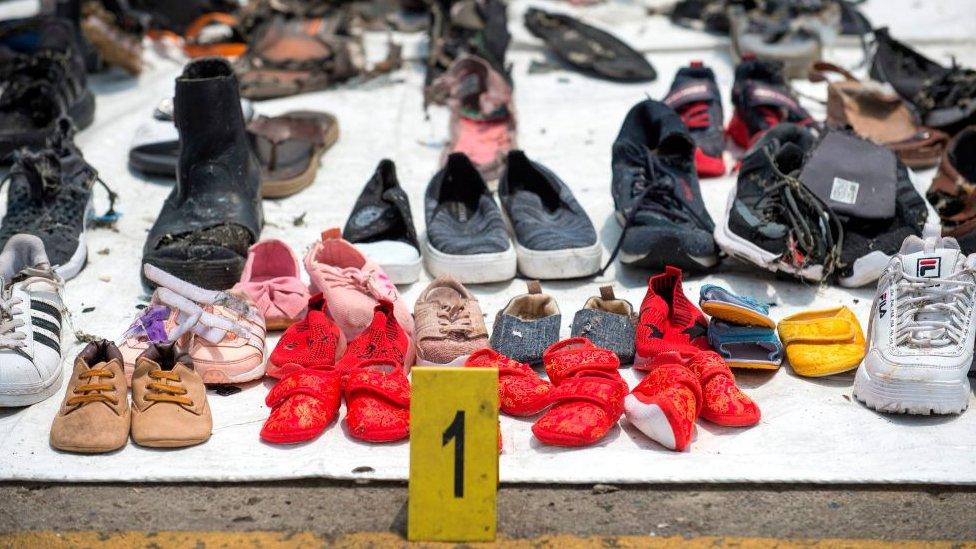
A Boeing 737 Max, operated by Indonesia's Lion Air, crashed into the sea killing all 189 passengers and crew
A US congressional report last month said Boeing's rush to production, a decision to ignore internal safety concerns and concealment of key changes to the plane, including pilot training needs, contributed to the accidents.
It also faulted the FAA for oversight lapses, including "excessive delegation to Boeing".
Congress has since approved legislation intended to reform the agency.
Boeing, which has estimated the cost of the grounding at roughly $20bn, still faces investigations, potential fines and other lawsuits as it tries to rebuild its reputation in the midst of what it has described as an unprecedented downturn in air travel.
Before the crashes, Boeing churned out more than 50 of the popular 737 Max per month. But airlines around the world have cancelled and delayed orders since the pandemic.
Last month, Boeing said it did not expect its production rate to top 30 planes a month until 2022. It warned investors of a backlog of about 450 737 Max planes, of which only about half of which would be delivered by the end of next year.
Which airlines fly the 737 Max?
American Airlines said it expected its first 737 Max flights in the US to resume on 29 December. United Airlines and Southwest Airlines said they planned to put their planes into service next year.
But consumer association Which? warned that many passengers may remain uncomfortable with the idea of flying the jet, which is used by airlines such as Tui and Ryanair in the UK.
"Airlines that plan on flying these aircraft should give passengers with existing bookings the option of transferring to another flight for free, while operators should also make clear which planes will be used for future bookings, so people can make an informed choice before travelling," travel editor Rory Boland said.
John Grant of aviation data firm OAG said upgrades, maintenance and pilot training required by the FAA are a logistical "nightmare" for airlines at a time of week demand, making it likely that many jets will not return to the skies soon.
The stain on Boeing will linger as well, he warned.
"It's got a bad name and it's going to take some time to recover," he said. "It will do. It's been certified, it's safe, but it's going to take time."
- Published28 October 2020
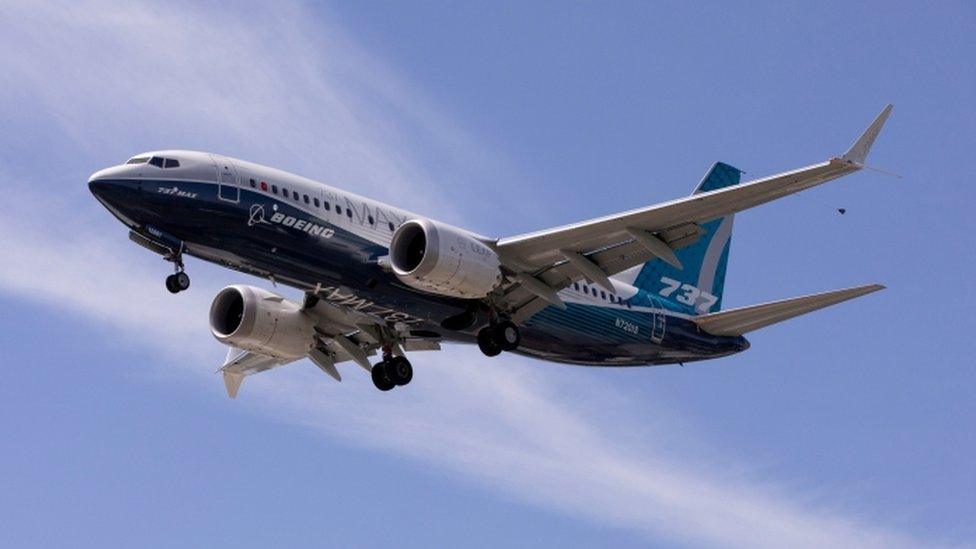
- Published16 September 2020

- Published10 March 2020
